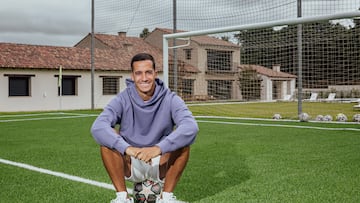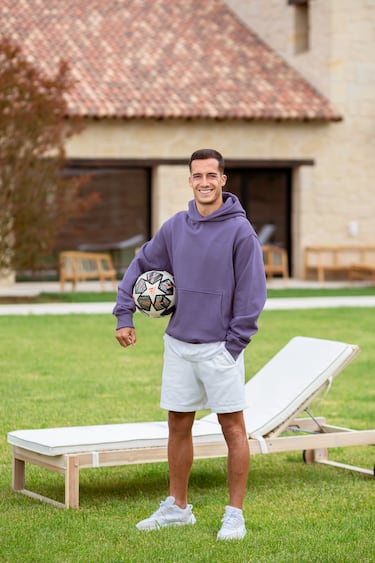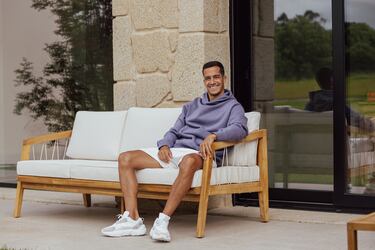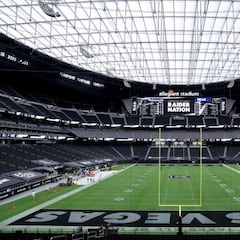Lucas Vázquez interview: Real Madrid star talks to AS
Ahead of his eighth season in the Real Madrid first team, winger-turned-full-back Lucas Vázquez is closing in on 300 appearances for Los Blancos. He sat down for a chat with AS.

A player who now cuts a mature figure both on and off the pitch, Lucas Vázquez is loving life in Carlo Ancelotti’s successful Real Madrid side. Though originally a winger, the Spaniard, 31, feels more and more at home playing at full-back for Los Blancos. He sat down to talk to AS journalist Tomás Roncero.
Last Friday, you turned 31. You’re at an age where, in times past, the feeling might have been that you didn’t have long left as a player. But between the physique you have and the way sports science has evolved, you may still have plenty of time ahead of you. What plans do you have for the future? Why have things changed so much?
People’s way of thinking, the football world’s way of thinking, has changed. As players, we have far greater means at our disposal to look after ourselves physically. Knowledge about how to maintain our bodies over the long term has improved. My plan is to play football for many years to come, and to enjoy this sport as much as possible.
What is the importance of the fitness coach? How great a sense do you get with Antonio Pintus, Madrid’s fitness coach, that the work you do with him is a necessary way of improving your physical preparation and preserving your professional career in the long term?
Pintus is really important. Particularly in preseason, when you have to put in more fitness work than usual. During the season, when you’ve got a game every three days, it’s harder to do so much. It also comes down to each individual player, and how much work they’re willing to do.
You made 41 appearances last season, many of which came in the critical period of the campaign. It used to be that if a player wasn’t a first-choice starter, they weren’t an important part of the squad. Nowadays, that’s no longer the case - you can still be a valuable member of the group even if you wouldn’t be in your team’s strongest XI.
At the end of the day, that’s exactly it. It’s about making the most of the game time you get. What’s important is to bring something to the team. It’s understandable that we all want to be starters, but when you’re not in the XI, your job is to give everything you have coming off the bench. I aim to play as many games as possible as a starter, and to improve that figure every year.
Has the influence you have had at Real Madrid exceeded the expectations you had when you arrived in 2015?
When I returned to Madrid, I was still just a kid. I was coming back to the club after a year playing top-flight football with Espanyol, having enjoyed a great opportunity over there after leaving Castilla [Madrid’s ‘B’ team]. When I came back, my aim was to be at Madrid for many years and to work tooth and nail to achieve that. I’m really happy with the career I’ve had here, and I hope it continues for many more years to come.
You’re closing in on your 300th appearance for Real Madrid…
I’m going to do everything I can to make many more appearances than that, but it’s a milestone that speaks volumes for the work I’ve put in over the years. I’m really pleased.
At Madrid, you’ve played under Rafa Benítez, Zinedine Zidane, Julen Lopetegui, Santiago Solari, Zidane again, and, now, Carlo Ancelotti. How does the coach influence you as a player? Is it about the confidence they place in you?
Every coach has their way of coaching and of understanding the game, the kind of player they like… But the only way you’re going to play well and make a difference on the pitch is through hard work day in, day out. By showing every day that you are ready to play for Real Madrid. That’s what I try to do: battle hard to earn playing time and prove myself to my coach, so that they give me confidence and that confidence helps me to perform better every day.
Are you just as happy playing at full-back, or do you prefer to play as a winger?
I’ll be honest with you. Since I was a kid, my focus has always been on attacking and playing as a winger. And scoring goals. So to begin with, I wasn’t totally at home when I was picked as a full-back; I didn’t enjoy it. But now I’ve been playing there for a year and a half, and I feel more at home with every game. I’m really enjoying playing as a full-back now. My aim is to perform better and better in each game, do well for the team and make myself an important player in that position.

I was particularly impressed with your last half an hour in the Champions League last-16 second leg against Paris Saint-Germain. There were two occasions when Kylian Mbappé set off on forward runs, but you dealt with him. That night, did you get the sense you had arrived as a defender?
Yeah, it was maybe a reflection of that in what was a really important game for the team. But it’s just a single snapshot of all the work I’ve done, and everything I’ve learned, throughout the year and a half that I’ve been playing at full-back. That was a special moment, against PSG, in an epic comeback at the Bernabéu. I’ve really taken on board the things you have to learn as a defender, and I feel more and more at home at full-back.
Carlo Ancelotti has an unbelievable coaching CV, possibly the best in the world. What is his secret for keeping all his players, even those who get less game time, happy and committed to the cause?
Put simply, his secret is that he’s a good guy with a really good heart. That’s his biggest secret.
In last season’s Champions League, no-one expected Real Madrid to win it, but you just kept knocking aside your opponents: PSG, Chelsea, Manchester City, Liverpool… What were you saying to each other in the dressing room? What was that campaign like?
It was a crazy Champions League campaign. The secret to our success was the philosophy that defines Real Madrid: never giving up, believing right until the very end, everyone pulling in the same direction… They all sound like clichés, but that’s what it was all about. There were moments in the knockout stages where we were completely out of it, but we had key periods where we played really well, be it because of the magic of the Bernabéu, because we were playing in front of our home fans. Every single player believed in what we could achieve as a team, and we made it possible to reach the final. La Decimocuarta [Madrid’s 14th European Cup win] was very special for everyone.
Except perhaps for La Décima - the club’s 10th European title, won against Atlético Madrid in 2014 - it’s arguable that Real Madrid fans would choose La Decimocuarta as their favourite Champions League win.
Emotionally, our run towards the final in Paris is hard to surpass. It was crazy. Playing those return legs at the Bernabéu against those big teams made it all the more special for us, for the fans, for everyone.
Could you see the uncertainty in your opponents’ eyes?
It was less about our opponents than about us. We knew that at any point we could turn it around, that we could create a clear goalscoring opportunity. Knowing that the fans were there getting right behind us was really important for us. When we’re struggling a little bit mentally, they drive us on. They create the kind of magical atmosphere that led to what happened.
There are always people who say that Real Madrid are very lucky. Why are some so reluctant to give Madrid credit for their achievements?
There’s always debate around champions. Every club would like to have 14 European Cups like us and would like to have won last season’s Champions League. The fact that we’ve won so many in recent years means there are people who want to place doubt on whether or not we’ve deserved them, but I think there can be no arguments about the trophies we’ve won.
In Barcelona, they’re in the midst of a debate about style. They argue that Real Madrid might win trophies, but not by playing good football…
The concept of playing good football comes with many nuances. Playing good football also means defending well, counter-attacking well, finishing well, being focused, showing good character in the face of comebacks… There are a range of styles of play, all of which deserve respect, but what we like above all else is winning. This season, we won the Champions League, LaLiga and the Spanish Super Cup. You don’t win three trophies of that importance by playing bad football. At the end of the day, we’re back to the same thing: it’s a case of questioning clear champions for the sake of questioning them.
Were you surprised Kylian Mbappé rejected a move to Madrid? What’s your take on his decision - do you think he’ll regret it?
It wasn’t a straightforward situation, especially not for him: he was under a lot of pressure. I don’t know what happened. You have to respect his decision. I hope he’s very happy and that we can enjoy watching him for many years, because Mbappé is a great player.
In the Real Madrid team, you have two veterans in Luka Modric, 36, and Karim Benzema, 34. Two leaders whose performances you just cannot argue with. Do you think it’s inspiring to the youngsters coming through to see that the two oldest players in the team aren’t there because of who they are, but because of the displays they put in?
They’re an example; that’s the word to describe them. They’re players who, at 34 and 36, run more than anyone else in games. They’re really important players for us. Who would have thought that Luka would start week in, week out in central midfield at the age of 36! That Benzema would be Madrid’s number nine, the top scorer in LaLiga, scoring 44 goals last season, at 34! That shows you that football has changed, that players take better and better care of themselves, that there’s a greater degree of professionalism. They’re an example for everyone to follow. Modric is better now, at 36, than when I arrived and he was 29. The same goes for Karim: he’s a better player now than seven years ago. I’ve watched him evolve and have been able to enjoy the football he plays. It’s wonderful to see. They’re two role models, not just for us at Madrid, but for world football.
Together with Nacho Fernández and Dani Carvajal, you’re one of three youth products in the squad that have had a major impact on the club’s fortunes. However, it feels like academy players are no longer breaking through. What’s that down to? A lack of talent? A lack of patience?
There can be no doubts about the work the Real Madrid youth academy does. It’s a production line of good players. But breaking into the first team is also about timing, about circumstances. No-one should have any doubts about the youth academy. Every year, it provides players for the top two tiers of Spanish league football. Right now there are some very good players in the Castilla and Under-19 teams. It’s a question of giving them their opportunity. I’m sure that some very good players are going to come through in the near future.
Next season, Madrid will be competing in six competitions. Could Los Blancos do the sextuple?
Yeah, we can do it, because we’re going to give our all in each of them. Our duty at this club is always to win everything in front of us. By working hard, fighting tooth and nail, and never taking anything for granted, we’ll go after every trophy available to us, starting with the UEFA Super Cup against Eintracht Frankfurt on 10 August. We’ll give our all to lift those six trophies.
There are Madrid fans whose sights are already set on the Champions League final in Istanbul in 2023, and on winning the club’s 15th European title. Do you share that mentality?
I mean, that has to be our mentality. We know what this club demands: you have to win as many trophies as possible every year. We’re aware of that. We know that it’s a wonderful achievement that we’ve won 14 European Cups. We’ve enjoyed it, we’ve celebrated it in style and it’s been great. But now, from the moment preseason begins, we’re only thinking about winning the UEFA Super Cup, LaLiga, the Champions League, the Spanish Super Cup, the FIFA Club World Cup, the Copa del Rey… everything.

I’d like to take you back to the moment you took the first penalty in the 2016 Champions League final shootout. Did you ask to be given the first spot-kick? And those tricks you did with the ball as you stepped up, were they a strategy to let the opposition know you weren’t worried? It’s an iconic image…
Yeah, absolutely. It’s a good one [laughs]. I’d felt good during the game: the last 20 minutes of the 90, extra time… I felt full of confidence, and when it came to the shootout I asked to take a penalty, and ended up being first. No problem. I took it, scored it, and we won the Champions League. Everything went perfectly. As for the tricks, it’s just something that I did instinctively. I hadn’t thought about it and wasn’t really aware of what I was doing.
You went to the 2018 World Cup with Spain. Do you think you have a way back into the squad after so long without being picked, or have you closed the door to that in your mind? Luis Enrique likes players who press hard off the ball in the way you do. Do you still think you have a chance of going to Qatar?
I think I do still have a chance, yeah. In his time as Spain head coach, Luis Enrique has kept the door open to every player. Going to the World Cup is a goal I have in my head and I’m going to work hard and give my all from now until November to try and get myself on that plane.
You’re watching an awe-inspiring new Bernabéu take shape. That’s also something that must motivate you.
Yeah. It’s going to be spectacular. The day the Bernabéu is completed, it’s going to be amazing. We can’t wait to play in the revamped stadium and enjoy it with our fans in the stands for many years to come.
What goals do you still have in football? Do you find the life of a professional footballer fulfilling?
My mindset every year is to reset and motivate myself once again to try and win everything, be a better footballer every day, try to improve those areas of my game that are weaker. I find being a footballer totally fulfilling. We’re lucky; at least, I consider myself lucky. I’m doing something I’ve enjoyed since I was three or four years old. I love football, I love training, playing, watching football… I think I’ve been very lucky in life and I work hard to make sure this’ll last for many years to come.
When you hang up your boots, do you see yourself going into coaching or an off-field role? Do you want to stay in football?
Related stories
Yeah, I’d like to stay in the game. In what kind of role I don’t know, but I’d certainly like to remain associated with football and enjoy the game for the rest of my life.
I hope by then you have another four or five Champions League titles and we can celebrate them together.
I hope so [laughs].


